人教版七年级下英语Unit-教学导案、导学案
人教版七年级英语下册导学案:Unit 1 Can you play the guitar

学习目标1.通过看图辨认单词,让学生背会有关学校文艺活动的词汇。
2.通过听录音组对话,同伴交流,能用Can引导的一般疑问句询问对方的能力,并进行肯、否回答。
3. 通过分角色表演对话,让学生运用What +club/sport 引导的特殊疑问句进行问答,询问对方想加入的俱乐部以及自己擅长的体育项目。
上课时间审核领导教与学的过程思考、点拨、小结自主学习自我检测(10分)一.自主完成1a,将单词与图片匹配。
.二.读背1a单词,并默写7个活动的单词或词组:唱歌_______________ 游泳_________________跳舞_______________ 绘画_________________下棋_______________ 讲英语_________________弹吉他_______________三.完成1b,仿照1b,自学1c,对桌交流编对话:A: I want to join the music club ?B:Can you sing ?A:Yes,I can.四.完成2a、2b听力内容。
五.根据听力内容,练习2c:用Can引导一般疑问句及其肯、否回答及Wh at club 引导特殊疑问句回答想加入什么俱乐部。
自主学习完1a、2a, 2b之后,读背并默写出下列短语:1.下棋2.讲英语3.弹吉他4.英语俱乐部5.艺术俱乐部6音乐俱乐部7棋类俱乐部8游泳俱乐部合作交流组内互测(10分)你喜欢什么活动?想加入什么俱乐部?对桌交流,互相询问:A: I want to join the music club ?B:Can you sing ?A:Yes,I can.四、盘点收获(课后反思)2分钟展示解疑点拨提升(10分)总结本节课的语法:1.情态动词can的用法:1)can后跟____________。
2)你能写出2个Can引导的一般疑问句么,并分别进行肯定和否定回答:________________________________ ____________________________________________ ____________2.默写下列句子:你想加入什么俱乐部?________________________你能进行什么运动?__________________________巩固训练、当堂检测:(每小题5分,满分100)分数:___________ 一、连词成句。
人教版七年级英语下册导学案-Unit 4 Don't eat in class

Unit 4 Don’t eat in class .第1课时Section A 新授课导学案【预习指导】一、扫清障碍根据音标读出19到21页的单词,能初步记忆单词。
二、课本预习:熟读课本19 到21页, 划出重要的新短语,新句型。
三、预习效果检查。
1.在外面________2.穿,戴________3.重要的________4.带来________5.校服________6.安静的________7.规则8 。
到达________9.走廊________ 10 。
大厅________ 11.餐厅________ 12.听________ 13. 打架_________ 14.抱歉的,难过的________1.听音乐_________________2.在音乐教室里_________________3.在外面吃东西_________________4.戴帽子_________________5.很多规则_________________6.…中的一些_________________7.拿来,带来_________________ 8.音乐播放器_________________9.不得不,必须_________________ 10.保持安静_________________11.图书馆规则_________________ 12.在我梦想中的学校_________________ 13.上课迟到14.准时15.在走廊里_________________ 16. 在餐厅里_________________17.在教室里_________________ 18.在图书馆_________________19.在课堂上_________________ 20.穿校服_________________【知识点拨】1. arrive late for= be late for 做某事迟到。
Don’t arrive late for the meeting next time 下次开会别迟到2、语法(祈使句)祈使句是用来表示请求、命令、叮嘱、号召或者劝告等的句子,这类句子的主语常是第二人称you,也就是听话者,因而you常省去了。
人教版七下英语全册导学案
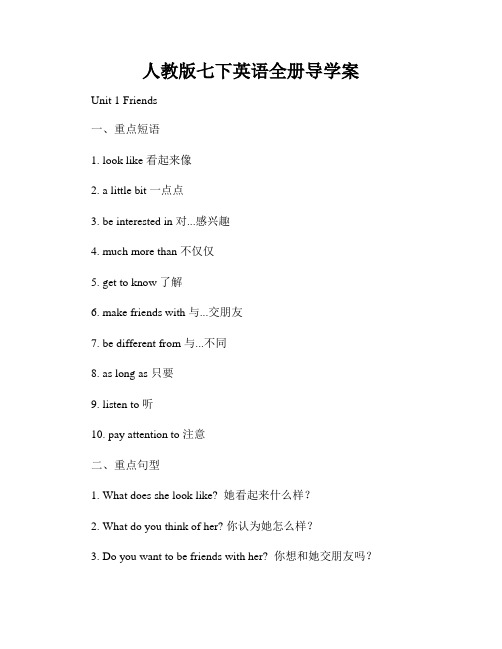
人教版七下英语全册导学案Unit 1 Friends一、重点短语1. look like 看起来像2. a little bit 一点点3. be interested in 对...感兴趣4. much more than 不仅仅5. get to know 了解6. make friends with 与...交朋友7. be different from 与...不同8. as long as 只要9. listen to 听10. pay attention to 注意二、重点句型1. What does she look like? 她看起来什么样?2. What do you think of her? 你认为她怎么样?3. Do you want to be friends with her? 你想和她交朋友吗?4. How do you get on with your classmates? 你和你的同学相处得怎么样?5. I think she is friendly and outgoing. 我认为她友好并且外向。
6. I’m not very outgoing, but I’m very kind. 我不太外向,但是我很善良。
7. As long as she is friendly, I’m happy to make friends with her. 只要她友好,我很高兴和她交朋友。
8. He is different from me, but he gets on well with his classmates. 他和我不同,但是他和他的同学相处得很好。
9. I pay attention to my friend s’ feelings because I think it’s important. 我关注我的朋友的感受,因为我认为这很重要。
三、词汇运用1. 根据句意和首字母提示填入适当的词1) My cousin looks like her father, but she is a l_________ like her mother.2) He is very friendly and o_________. He has many friends.3) My sister is very k________ to everyone and she gets on well with her classmates.4) She is not very o________, but she is very easygoing.5) Nick is different from his brother. He is more i________ in music.2. 选择合适的词填入空格1) My friend is very _________ (outgoing, interested) in basketball and he plays it every day.2) Lucy pays a lot of attention to her _________ (families, friends) because she cares about them.3) My grandfather is very _________ (kind, similar) to all his grandchildren and he loves us very much.4) She is a little bit _________ (friendly, different) from others, but she also has many friends.5) If you want to _________(get to know, make friends) with someone, you need to be friendly and kind.Unit 2 Festivals一、重点短语1. at the beginning of 在...开始时2. send sb. sth. 向某人送去…3. in the west 在西方4. unlike sb./sth. 不同于5. look like 看起来像6. wear costumes 穿着服装7. on the 15th day of the 1st lunar month 农历正月十五8. be similar to 与...相似9. make dumplings 包饺子10. have fun 玩得开心二、重点句型1. What do people do on Mid-Autumn Festival? 中秋节的时候人们做什么?2. Are there any differences among different countries? 不同国家有什么不同之处?3. What do you think of the festival? 你觉得这个节日怎么样?4. In China, people often eat moon cakes during Mid-Autumn Festival. 在中国,中秋节的时候人们常吃月饼。
人教七年级下英语UNIT10—SA-SB导学案

七年级英语导学案(Unit 10 Section A 1a-grammar focus)姓名学习目标1、学会谈论过去发生的事件—学习一般过去时的用法2、掌握规则动词的变换规则3、熟记一些常用的不规则动词4、能向小组成员用英语介绍生活中的日常活动,如:stay at home , go to the beach, do my home work, watch TV, visit my uncle, go to New York, et课前导学:1、试一试你能写出下列各词的过去式吗?stay_________ do_________ stop_________play_________ is_________ like_________visit_________ are_________ carry_________2、快乐译一译stay at home_________ ___go to summer camp_____________ go to New York city_______ go to the mountains________ visit my uncle____________go to the beach_____________ 课堂导学:一、根据句意及首字母提示写单词。
1.The math e_________was difficult for me .2.We want to go to the m_________ to learn about science3.My father and I v_________ Uncle Wang last Sunday.二、句子改写1.I am playing computer games now.(用last night改写)I _______ _________ _________ last night2.I watched an interesting TV show.(改为否定句)I ________ ________ an interesting TV show 三、根据提示写句子。
新版人教版七年级下册英语导学案(全册)
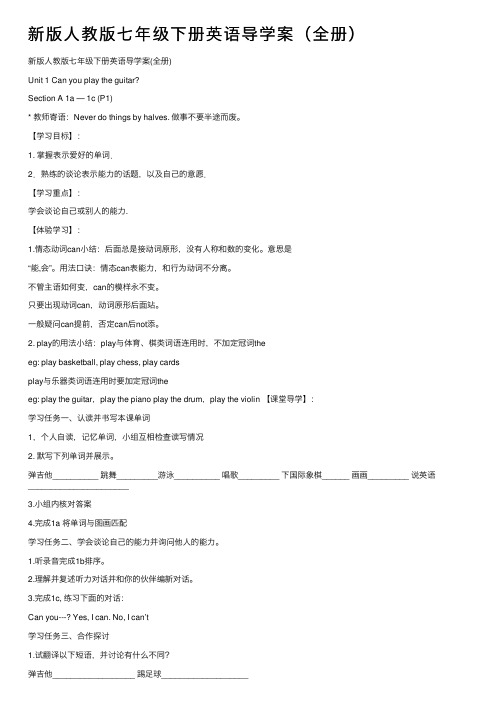
新版⼈教版七年级下册英语导学案(全册)新版⼈教版七年级下册英语导学案(全册)Unit 1 Can you play the guitar?Section A 1a — 1c (P1)* 教师寄语:Never do things by halves. 做事不要半途⽽废。
【学习⽬标】:1. 掌握表⽰爱好的单词.2.熟练的谈论表⽰能⼒的话题,以及⾃⼰的意愿.【学习重点】:学会谈论⾃⼰或别⼈的能⼒.【体验学习】:1.情态动词can⼩结:后⾯总是接动词原形,没有⼈称和数的变化。
意思是“能,会”。
⽤法⼝诀:情态can表能⼒,和⾏为动词不分离。
不管主语如何变,can的模样永不变。
只要出现动词can,动词原形后⾯站。
⼀般疑问can提前,否定can后not添。
2. play的⽤法⼩结:play与体育、棋类词语连⽤时,不加定冠词theeg: play basketball, play chess, play cardsplay与乐器类词语连⽤时要加定冠词theeg: play the guitar,play the piano play the drum,play the violin 【课堂导学】:学习任务⼀、认读并书写本课单词1,个⼈⾃读,记忆单词,⼩组互相检查读写情况2. 默写下列单词并展⽰。
弹吉他__________ 跳舞_________游泳__________ 唱歌_________ 下国际象棋______ 画画_________ 说英语______________________3.⼩组内核对答案4.完成1a 将单词与图画匹配学习任务⼆、学会谈论⾃⼰的能⼒并询问他⼈的能⼒。
1.听录⾳完成1b排序。
2.理解并复述听⼒对话并和你的伙伴编新对话。
3.完成1c, 练习下⾯的对话:Can you---? Yes, I can. No, I can’t学习任务三、合作探讨1.试翻译以下短语,并讨论有什么不同?弹吉他__________________ 踢⾜球___________________2.讨论如何询问第三⼈称能⼒的句型---Can he sing? ---Yes, he can. / No, he can't.---Can Tom speak English? ---Yes, he can. / No, he can't.【⾃主检测】:I.精挑细选1. Can you ________ English?A. speakB. talkC. say2. Can he __________ basketball?A. playB. playsC. playing3. My brother want _______ the chess club.A. joinB. to joinC. joins4. Mary can play the chess________ she can't swim.A. andB. orC. but5. His brother plays _______ piano every day.A. /B. aC. theII.翻译官说英语_____________ 弹吉他_____________ 象棋俱乐部__________ 下象棋______________ 英语俱乐部_____________ ⾳乐俱乐部__________ 美术俱乐部___________ 游泳俱乐部_____________ 参加___________ Ⅲ. 补全对话A. Can you ___________(唱歌)?B. Yes, I ________. Can you _________(游泳)?A. No, I want to join _______________(象棋俱乐部).B. I don't like ______________(象棋)A. What club do you want to __________?Unit 1 Can you play the guitar?Section A 2a— 2d (P2)* 教师寄语:Never do things by halves. 做事不要半途⽽废。
(人教版)七年级下册英语导学案:Unit 3 How do you get to school
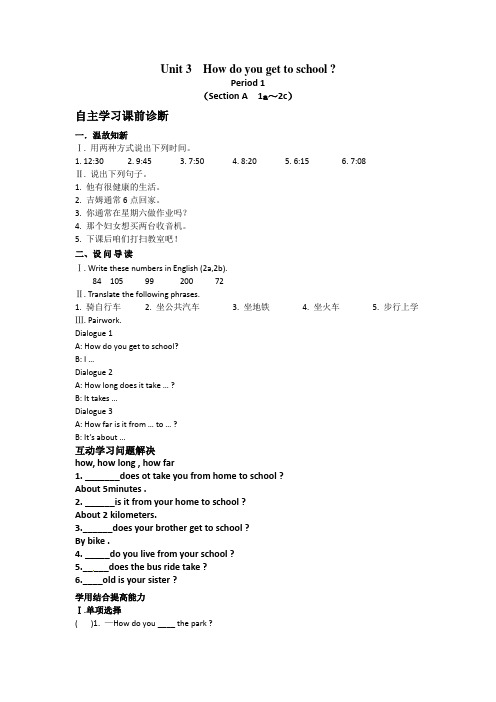
Unit 3 How do you get to school ?Period 1(Section A 1a~2c)自主学习课前诊断一.温故知新Ⅰ. 用两种方式说出下列时间。
1. 12:302. 9:453. 7:504. 8:205. 6:156. 7:08Ⅱ. 说出下列句子。
1. 他有很健康的生活。
2. 吉姆通常6点回家。
3. 你通常在星期六做作业吗?4. 那个妇女想买两台收音机。
5. 下课后咱们打扫教室吧!二、设问导读Ⅰ. Write these numbers in English (2a,2b).84 105 99 200 72Ⅱ. Translate the following phrases.1. 骑自行车2. 坐公共汽车3. 坐地铁4. 坐火车5. 步行上学Ⅲ. Pairwork.Dialogue 1A: How do you get to school?B: I …Dialogue 2A: How long does it take … ?B: It takes …Dialogue 3A: How far is it from … to … ?B: It’s about …互动学习问题解决how, how long , how far1. _______does ot take you from home to school ?About 5minutes .2. ______is it from your home to school ?About 2 kilometers.3.______does your brother get to school ?By bike .4. _____do you live from your school ?5._____does the bus ride take ?6.____old is your sister ?学用结合提高能力Ⅰ.单项选择( )1. —How do you ____ the park ?—I ____ a bus.A. get; byB. get to; takeC. get; take( ) 2. —Does your father go to work _________bus?—No, he ________his bike .A. by; byB. take; ridesC. by; rides( ) 3. —_______is it from your home to school?—It’s about 2 kilometers.A. HowB. How longC. How far( ) 4.—I walk to school.___________?—I walk to school, too.A. How about youB. How do you doC. How think ( ) 5. How long does it _______ you to go home?A. takeB. needC. getⅡ. 用英语单词完成下列算式1. 40+30=70 _____+_____=_____2. 12+26=38 _____+_____=_____3. 50+60=110 _____+_____=_____4. 18-6=12 _____-_____=_____5. 20+36=56 _____+_____=_____Ⅲ. 按要求完成句子,每空一词1.My father goes to work by bike.(对划线部分提问)your father to work?2.Mary goes to school by subway.(改为同义句)Mary the subway school.3.He often watches TV for two hours in the evening.(对划线部分提问)does he often watch TV in the evening?4.His dictionary is 50 dollars.(对划线部分提问)is his dictionary?5.This is her bike. (改为同义句)This bike is .课堂小节,形成网络填入适当的句子补全对话A: Hello, Bill.B: Hello, Mike.A: 1._____________?B:I get up at six.A: 2._____________?B: I have some bread for breakfast.A: 3._____________?B: No, I don’t like salad.A: 4._____________?B:I go to school by bus.A: And last question. 5._____________?B: My favourite subject is English.A: Thank you.B: You’re welcome.Unit3 How do you get to school ?Period 2(Section A 2e~3c)自主学习课前诊断一、温故知新Useful phrases:1.到校______________2.上班____________3. 到家_________________4. 到这儿________________________5. 到那儿______________6.去上学______________________________7.去上班____________________ 8.回家___________________9.去那儿______________________10. .乘地铁________________11.乘公共汽车______________12.乘火车_________________13. 乘飞机___________14.乘出租车________________________15.乘船________________16.骑自行车_________________17.步行_____________ 18.开车送他上学______________19.多远________________20.多久________________二、设问导读Ⅰ. Read 2e (P14) and complete the conversation.A: Hey, Jane. Is this your new bike?B: Yes. I ride it to school everyday. 1. ____________________A: I usually take the bus.B: 2. ____________________A: I’m not sure —about 10 kilometers? The bus ride takes about 20 minutes. 3. _________B: About 15 minutes by bike. It’s good exercises.A: Yeah, well, have a good day at school.B: You, too.Ⅱ. Read Grammar focus (P15). Then finish 3a and 3b (P15) with your partner.三、自学检测Ⅰ. Pairwork: Practice 2e (P14) with your partner and make your own conversation. Then act it out.Ⅱ. 单项选择( ) 1.—Is this bike________?—No, it’s not ________.A. your; mineB. yours; mineC. your; my( ) 2. —When do they get _______ Beijing?—They get ________ there at 8:00.A. to; toB. / ; /C. to; /( ) 3. The _________takes about _________ hour.A. bus ride; anB. bus ride; aC. ride bus; an( ) 4. Going to school by bike is _________.A. a good exercise.B. good exercises.C. good exercise.( ) 5.—Does she take the bus to school?—_________.She goes by bike.A. Yes, she doesB. No, she doesn’tC. I’m not sure互动学习问题解决用take 填空。
人教版七年级下英语Unit1教案、导学案

Unit1 Canyouplaytheguitar?话题Topic 加入俱乐部(Joiningaclub)功能Functions 能够谈论自己或他人的能力(Talkabouttheabilities) A:Canyouplaytheguitar?B:Yes,Ican./No,Ican’t. A:Whatcanyoudo?B:Icandokungfu.语法Grammar 1.能够正确使用情态动词can(Modelverbcan)Icanplayping-pongandchess.Shecansinganddance.2.能正确使用包含can的一般疑问句并作简略回答 (Yes/Noquestionsandshortanswers)A:Canyoudance?B:Yes,Ican./No,Ican’t.3.能够正确使用what引导的特殊疑问句询问某人的能力及加入俱乐部的倾向(Whatquestions) A:Whatcanyoudo?B:Icandance.A:Whatclubdoyouwanttojoin?B:Iwanttojoinasportsclub.词汇和常用表达Words&expressions 1.能正确使用下列词汇 (Curriculumwords)(按词性排列)名词:guitar,chess,club,story,drum,violin,people,home,center(=centre),weekend,musician 动词:sing,draw,speak,join,tell,write,make,teach名词&动词:swim,dance,show,talk其他:or,also,today2.能正确使用下列常用表达(Usefulexpressions)playchess,speakEnglish,begoodat,begoodwith,talkto…,playthedrums/piano/violin,makefriends,help(sb.)withsth.,ontheweekend,sports/music/art/chessclub,joina(…)club,dokungfu3.能认读下列词汇(Non-curriculumwords)kungfu,piano学习策略Strategies 1.体会语块对于词汇学习的重要性2.通过文章标题猜测文章主题文化知识Culture 1.了解中外课外活动和社团活动的差异2.了解招聘海报的特点三维目标Three-dimensionaltarget 知识与技能1.能掌握以下单词:guitar,sing,swim,dance,draw,chess,speak,join,club,tell,story,write,show,or,talk,drum,violin,also,people,home,make,today,center(=centre),weekend,teach,musician2.能熟练掌握单元短语:playchess,playthedrums/piano/violin,speakEnglish,begoodat,begoodwith,talkto…,makefriends,help(sb.)withsth.,ontheweekend,joina(…)club,dokungfu3.能掌握以下句型:A:Canyouswim?B:Yes,Ican./No,Ican’t.A:Whatcanyoudo?B:Icandance.A:Whatclubdoyouwanttojoin?B:Wewanttojointhechessclub.三维目标Three-dimensionaltarget知识与技能4.了解以下语法:情态动词can表示“能,会”的用法;含有情态动词can的肯定句、否定句和疑问句的构成;what开头、用来询问能够做什么和参加什么俱乐部的疑问句的构成和回答;play 和表示棋类和球类的名词搭配时,和表示乐器的名词搭配时,the的用法。
(完整版)人教版英语七年级下册英语U1导学案(知识点解析)
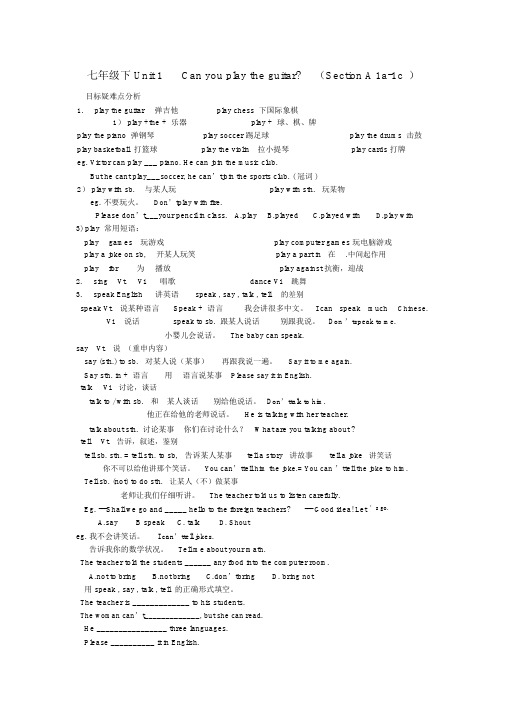
七年级下 Unit 1 Can you play the guitar?(Section A 1a-1c)目标疑难点分析1. play the guitar弹吉他play chess 下国际象棋1) play +the + 乐器play + 球、棋、牌play the piano 弹钢琴play soccer 踢足球play the drums 击鼓play basketball 打篮球play the violin拉小提琴play cards 打牌eg. Victor can play ___ piano. He can join the music club.But he cant play___soccer, he can’tjoin the sports club. ( 冠词 )2) play with sb.与某人玩play with sth.玩某物eg. 不要玩火。
Don’tplay with fire.Please don’t___your pencil in class. A.play B.played C.played with D.play with 3) play 常用短语:play games玩游戏play computer games 玩电脑游戏play a joke on sb,开某人玩笑play a part in在.中间起作用play for为播放play against 抗衡,迎战2. sing Vt. Vi唱歌dance Vi跳舞3. speak English讲英语speak , say , talk , tell的差别Chinese. speak Vt.说某种语言Speak + 语言我会讲很多中文。
I can speak much Vi 说话speak to sb. 跟某人说话别跟我说。
Don ’tspeak to me.小婴儿会说话。
The baby can speak.say Vt.说(重申内容)say (sth.) to sb.对某人说(某事)再跟我说一遍。
人教版英语七年级下册导学案:Unit 1 第三课时
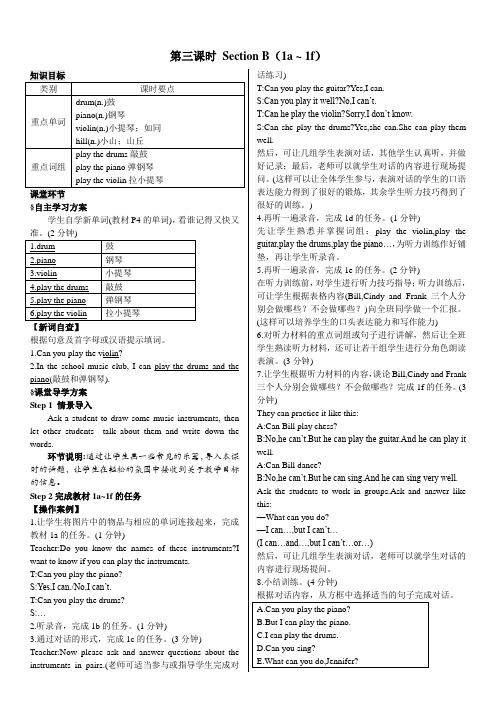
第三课时Section B(1a ~ 1f)知识目标类别课时要点重点单词drum(n.)鼓piano(n.)钢琴violin(n.)小提琴;如同hill(n.)小山;山丘重点词组play the drums敲鼓play the piano弹钢琴play the violin拉小提琴课堂环节§自主学习方案学生自学新单词(教材P4的单词),看谁记得又快又准。
(2分钟)1.drum 鼓2.piano 钢琴3.violin 小提琴4.play the drums 敲鼓5.play the piano 弹钢琴6.play the violin 拉小提琴【新词自查】根据句意及首字母或汉语提示填词。
1.Can you play the violin?2.In the school music club, I can play the drums and the piano(敲鼓和弹钢琴).§课堂导学方案Step 1 情景导入Ask a student to draw some music instruments, then let other students talk about them and write down the words.环节说明:通过让学生画一些常见的乐器,导入本课时的话题,让学生在轻松的氛围中接收到关于教学目标的信息。
Step 2完成教材1a~1f的任务【操作案例】1.让学生将图片中的物品与相应的单词连接起来,完成教材1a的任务。
(1分钟)Teacher:Do you know the names of these instruments?I want to know if you can play the instruments.T:Can you play the piano?S:Yes,I can./No,I can’t.T:Can you play the drums?S:…2.听录音,完成1b的任务。
七下英语导学案1-2-3单元

■预习导学Learning preparation
1、用英文写出下列国家和地区的名称并注上音标试读
1)加拿大__________ 2)法国_____________3)日本__________ 4)美国_____________
5)澳大利亚___________6)新加坡____________7)英国____________8)中国___________
9、Where______(be)his pen pals from?10、Gina _______(come)from Austrial.
11、I live in _________(French), I am ___________(France)
12、I am an ___________(Austrial)girl, I come from___________(Austrialian)
6.Where ______Linda_____? A、do, live B、does , lives C、is live D、does, live
7.Where ___Lily and Kate come from? A、does B、is C、do D、are
Unit 1 Where’s your pen pal from?
二学习流程learningprocedures预习导学learningpreparation1用英文写出下列国家和地区的名称并注上音标试读1加拿大2法国3日本4美国5澳大利亚6新加坡7英国8中国2一
单元:Unit1设计:龙艳、李多慧执笔:龙艳
初审:审核:、审批:
Unit 1 Where’s your pen pal from?
人教版七年级英语下册unit1第1课时导学案

专注:心无旁骛,万事可破新人教版七年级英语下册unit1第1课时导学案单元总览类别课程标准要求掌握的项目单元话题Talk about abilities:In this unit, students learn how to talk about what club they want to join and writethe advertisement for jobs.重点单词1.guitar(n.)2.sing(v.)3.swim(v.&n.)4.dance(v.&n.)5.draw(v.)6.chess(n.)7.speak(v.)8.join(v.)9.club(n.)10.tell(v.)11.story(n.)12.write(v.)13.show(n.&v.)14.talk(v.&n.)15.drum(n.)16.piano(n.)17.violin(n.)18.also(adv.)19.people(n.)20.home(n.&adv.)21.make(v.)22.today(adv.)23.center/centre(n.)24.weekend(n.)25.teach(v.)26.mus ician(n.)重点词组1.play chess2.speak English3.be good at…4.talk to…5.play the drums6.play the piano7.pla y the violin8.be good with…9.make friends10.help(.)with sth.11.on the weekend重点句式1.—Can you swim?—Yes,I can./No,I can’t. 2.—Can she speak English? —Yes,she can./No,sh e can’t.3.—What club do you want to join?—I want to join the music club.4.—What can you do? —I can dance.单元语法1.要求掌握情态动词can的用法,包括一般疑问句、特殊疑问句和否定句;2.要求学生会用目标语言Can you…?等仿写招聘广告。
初中英语人教版七年级下册第一单元第一学时导学案
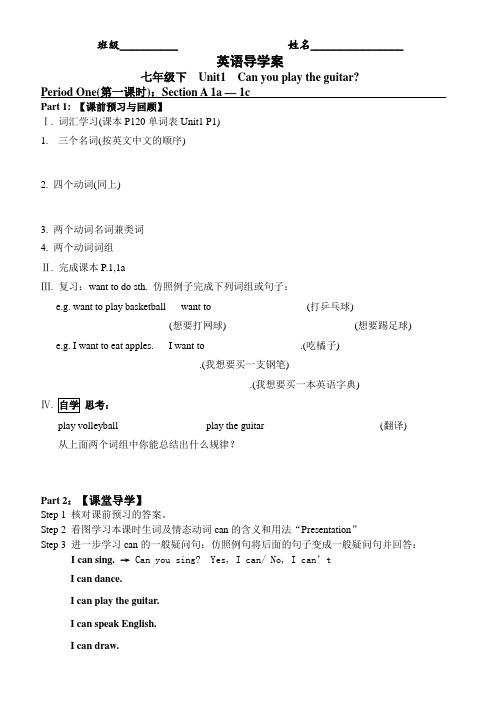
班级__________ 姓名________________英语导学案七年级下Unit1 Can you play the guitar?Period One(第一课时):Section A 1a — 1c ______________ Part 1: 【课前预习与回顾】Ⅰ. 词汇学习(课本P120单词表Unit1 P1)1.三个名词(按英文中文的顺序)____________ ________ ____________ ________ ____________ ________2. 四个动词(同上) ____________ ____________________ ________ ____________ ________ ____________ ________3. 两个动词名词兼类词____________ ________ ____________ ________Part 2:Step 1 核对课前预习的答案。
Step 2 看图学习本课时生词及情态动词can的含义和用法“Presentation”Step 3 进一步学习can的一般疑问句:仿照例句将后面的句子变成一般疑问句并回答:I can sing. →Can you sing? Yes, I can/ No, I can’tI can dance.I can play the guitar.I can speak English.I can draw.I can play chess.I can swim.Step 4 听力训练:1. 听第一遍,完成课本1b任务;2. 听第二遍,回答下列问题:1. In conversation 1, what club does the girl want to join? Can she sing?2. In conversation 2, can the boy swim?3. In conversation 3, what club does the girl want to join? Can she draw?Step 5. Pair work:对话练习。
2023年人教版七年级英语下册unit7-1导学案

Unit7 It’s raining!导学案Period 1: Section A 1a – 2cI. Learning aims and language points【学习目标和知识要点】:1. Words and expressions rain, windy, cloudy, sunny, snow, weather, cook, cold, warm, hot, (Moscow,Toronto, Boston, rainy, wind, cloud, sun, snowy, as usual )2. Key structures How’s the weather like in Beijing?It is sunny.3.Be able to describe the weather and what you are doing.II. Preparation【预习导航】:充分预习是高效学习的前提,请同学们全身心投入完成以下任务。
A. Content (预习内容): 预习课本P37-38; Unit 7单词表;课本P81,Notes on the Text, Unit 7-1。
B. Exercises (预习练习):1. Look at the sounds and read aloud. Write down the new words and their Chinese meanings and remember them. Underline them in the text with blue or black pen1) /reɪn/_____________________ 2) /ˈreɪni/____________________ 3) /ˈklaudi/_________________ 4) /ˈsʌni/____________________ 5) / ☜◆●♎/____________________ 6)/♦❍/__________________7) /kuk/__________________ 8) /ˈwɪndi/_____________________ 9)/♦⏹☜◆/___________________10)/ ♦♏❆☜/_________________ 11) /♒♦/ ______________________12)/ ♦⏹☜☺✋/_________________13)/ ❍♦☜◆/_____________ 14)/♦☜❒⏹♦☜◆/__________________15)/ ♌♦♦☜⏹/________________2. Look at the pictures in 2a on P38. Say what the people in the pictures are doing and write them down. 1) 2) 3) 4) 5)She ___________ She __________ ______________ _______________ ________________ _____________. ______________ ______________ _______________ ________________3. Work on 1a on P37.4. Give your answers after the example. Y ou can find the answers in your English -Chinese dictionary. Ex. sun (n.) 太阳→ sunny (adj.) 晴朗的(n. 名词;adj. 形容词;v. 动词;)1) cloud ( )________ → _______ ( )_________ 2) wind ( )_______ → _______ ( )__________ 3) rain ( )________ → _______ ( )_________ 4) snow ( ) ________→ ______ ( )_________ 5) fog ( )________ → _______ ( )_________ 6) storm( )_______ → _______ ( )_________5. Look at the pictures and complete the sentences.1)○2How’s ________________ _________________________in Beijing? in Shanghai?It’s __________________. ________________________III. Procedures 【课堂学习】Step 1. Preparation for 2a and 2b1. Work in groups and discuss the answers to Ex. 1 &2.2. Display the answers to Ex. 1 & 2.Step 2. Listening and speaking practice1. Work on 2a. Listen and number the pictures.2. Work on 2b. Listen and match the names with activities.3. Work on 2c. Ask and answer the questions.4. Read after the tape and imitate the conversation in 2a & 2b.Step 3. Preparation for 1a, 1b & 1c.1. Work in groups and discuss the answers to Ex. 3, 4 & 5.2. Display the answers to Ex. 3, 4 & 5.Step 4. Listening and speaking practice.1. Work on 1b. Write the city names in the boxes in the picture in 1a and check the answers.2. Listen again and write the weather vocabulary(天气词汇) under the city names.3. Report the answers like, “It’s sunny in Beijing”.4. Listen and repeat. Imitate the pronunciation.5. Ss work in pairs and practice the conversation in 1c. Check some pairs.Step 5. Making conversations.1. Look at the pictures in 3b and fill in the chart.2. Imagine you are the people in the pictures and make a telephone conversation.A: Hello, _____________ speaking.B: Hi, ___________. This is _____________ speaking. A: What are you doing, _____________?B: _________________________________________. What about you? What are you doing?A: _________________________________________. ___________ the weather there? Is it ___________? B: No, it isn’t. ________________________________. __________________________ in your place?A: Well, ________________________________. Ok, have a nice day!B: Thanks! You, too.A: Thank you! Goodbye.B: Goodbye!3. Display your conversations before the class. Catch your chance(抓住机会).(There are three chances.) (A段展示分满分为2分,B段为4分,C段为6分)IV. Test 【课堂检测】:根据课文内容填空。
人教七年级下册Unit4导学案设计(有答案)
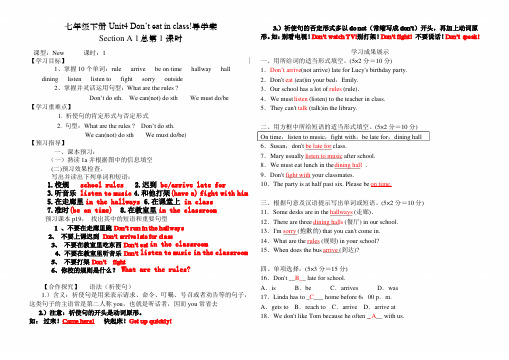
七年级下册Unit4 Don’t eat in class!导学案Section A 1总第1课时课型:New课时:1【学习目标】1、掌握10个单词:rule arrive be on time hallway halldining listen listen to fight sorry outside2、掌握并灵活运用句型:What are the rules ?Don’t do sth.We can(not) do sth We must do/be【学习重难点】1.祈使句的肯定形式与否定形式2.句型:What are the rules ?Don’t do sth.We can(not) do sth We must do/be)【预习指导】一、课本预习:(一)熟读1a并根据图中的信息填空(二)预习效果检查。
写出并读出下列单词和短语:1.校规school rules2.迟到be/arrive late for3.听音乐listen to music4.和他打架(have a)fight with him5.在走廊里in the hallways6.在课堂上 in class7.准时(be on time)8.在教室里in the classroom预习课本p19,找出其中的短语和重要句型1、不要在走廊里跑Don’t run in the hallways2、不要上课迟到Don’t arrive late for class3、不要在教室里吃东西Don’t eat in the classroom4、不要在教室里听音乐Don’t listen to music in the classroom5、不要打架Don’t fight6、你校的规则是什么?What are the rules?【合作探究】语法(祈使句)1.)含义:祈使句是用来表示请求、命令、叮嘱、号召或者劝告等的句子,这类句子的主语常是第二人称you,也就是听话者,因而you常省去2.)注意:祈使句的开头是动词原形。
人教版七年级英语下册《Unit1Section A2d—3c》导学案
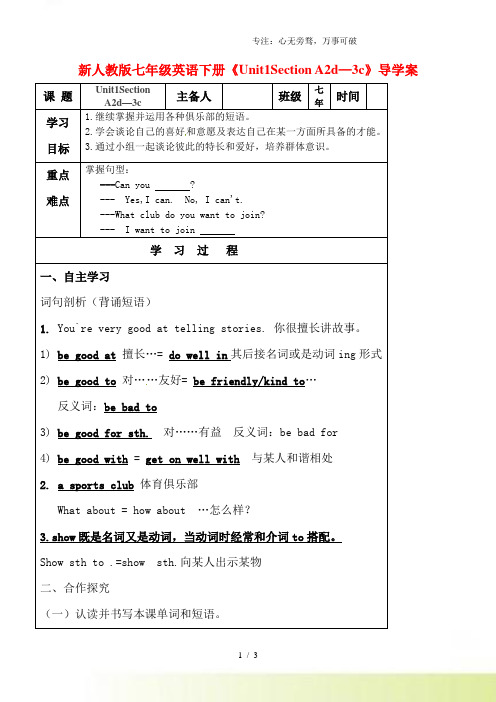
新人教版七年级英语下册《Unit1Section A2d—3c》导学案课题Unit1SectionA2d—3c 主备人班级七年时间学习目标1.继续掌握并运用各种俱乐部的短语。
2.学会谈论自己的喜好和意愿及表达自己在某一方面所具备的才能。
3.通过小组一起谈论彼此的特长和爱好,培养群体意识。
重点难点掌握句型:---Can you ?--- Yes,I can. No, I can't.---What club do you want to join? --- I want to join学习过程一、自主学习词句剖析(背诵短语)1. You`re very good at telling stories. 你很擅长讲故事。
1) be good at擅长…= do well in其后接名词或是动词ing形式2) be good to对……友好= be friendly/kind to…反义词:be bad to3) be good for sth.对……有益反义词:be bad for4) be good with = get on well with与某人和谐相处2. a sports club体育俱乐部What about = how about …怎么样?3.show既是名词又是动词,当动词时经常和介词to搭配。
Show sth to .=show sth.向某人出示某物二、合作探究(一)认读并书写本课单词和短语。
(二)小组合作学习1.分角色朗读并翻译2d 。
2.复述并模仿对话。
(三)背诵Grammar Focus.(四)完成3a、3b、3c.【课堂练习】一、根据句意及词首字母写出单词。
1.John wants to j ________ the music club.2.Can you s ________ English?3.I can play the guitar but can't play the p ________. 4.The girl can dance w .5.Can you s ________ me the book?二、用完整形式回答问题。
- 1、下载文档前请自行甄别文档内容的完整性,平台不提供额外的编辑、内容补充、找答案等附加服务。
- 2、"仅部分预览"的文档,不可在线预览部分如存在完整性等问题,可反馈申请退款(可完整预览的文档不适用该条件!)。
- 3、如文档侵犯您的权益,请联系客服反馈,我们会尽快为您处理(人工客服工作时间:9:00-18:30)。
人教版七年级下英语Unit-教案、导学案————————————————————————————————作者:————————————————————————————————日期:七年级英语·下新目标【人】Unit 1 Can you play the guitar?话题Topic 加入俱乐部(Joining a club)功能Functions 能够谈论自己或他人的能力(Talk about the abilities) A:Can you play the guitar?B:Yes,I can./No,I can’t. A:What can you do?B:I can do kung fu.语法Grammar 1.能够正确使用情态动词can (Model verb can)I can play ping-pong and chess.She can sing and dance.2.能正确使用包含can的一般疑问句并作简略回答 (Yes/No questions and short answers)A:Can you dance?B:Yes,I can./No,I can’t.3.能够正确使用what引导的特殊疑问句询问某人的能力及加入俱乐部的倾向(What questions)A:What can you do?B:I can dance.A:What club do you want to join?B:I want to join a sports club.词汇和常用表达Words & expressions 1.能正确使用下列词汇 (Curriculum words)(按词性排列)名词:guitar,chess,club,story,drum,violin,people,home,center (=centre), weekend,musician 动词:sing,draw,speak,join,tell,write,make,teach名词&动词:swim,dance,show,talk其他:or,also,today2.能正确使用下列常用表达(Useful expressions)play chess,speak English,be good at,be good with,talk to…,play the drums/piano/violin,make friends,help (sb.)with sth.,on theweekend,sports/music/art/chess club,join a(…)club,do kung fu3.能认读下列词汇(Non-curriculum words)kung fu,piano学习策略Strategies 1.体会语块对于词汇学习的重要性2.通过文章标题猜测文章主题文化知识Culture1.了解中外课外活动和社团活动的差异2.了解招聘海报的特点三维目标Three-dimensionaltarget 知识与技能1.能掌握以下单词:guitar,sing,swim,dance,draw,chess,speak,join,club,tell,story,write,show,or,talk,drum,violin,also,people,home,make,today,center (=centre),weekend,teach,musician2.能熟练掌握单元短语:play chess,play thedrums/piano/violin,speak English,be good at,be good with,talkto…,make friends,help (sb.)with sth.,on the weekend,join a(…)club,do kung fu3.能掌握以下句型:A:Can you swim?B:Yes,I can./No,I can’t.A:What can you do?B:I can dance.A:What club do you want to join?B:We want to join the chess club.三维目标Three-dimensionaltarget 知识与技能4.了解以下语法:情态动词can表示“能,会”的用法;含有情态动词can的肯定句、否定句和疑问句的构成;what开头、用来询问能够做什么和参加什么俱乐部的疑问句的构成和回答;play 和表示棋类和球类的名词搭配时,和表示乐器的名词搭配时,the的用法。
5.准确把握can的肯定句和否定句的重音变化。
过程与方法1.通过师生问答、生生对话、角色扮演等多种语言交际活动,培养口语交际能力和在日常生活中运用英语的能力。
2.通过图片或身体动作提供语境,运用学生的实际情况作例子,感知、学习I want to join a…club.进一步学习Can you…?Yes,I can./No,Ican’t.What can you do?What club do you want to join?等句型,进入本单元的话题。
创设情境学习、操练含有情态动词can的句子,学生结合自己的实际情况提出和回答问题,借助多媒体提供画面或视频来提高学生的主动性和积极性。
情感态度与价值观1.在学习的过程中学会积极参与,并能够结合自己的情况运用学到的句型。
2.了解中外社团和课外活动的情况。
3.积极、主动学说英语,能够参加课外活动,培养爱好。
Section A概述本部分通过图片导入俱乐部招聘以及学生应聘的情境,并在此语境中输入谈论能力、介绍及选择俱乐部等相关句型和重点词汇,以及招聘海报的典型文本。
1.1a—1c是本单元的导入部分。
1a通过主题图集中呈现有关才能及俱乐部名称的核心词汇和句型,主题图展现的是学习俱乐部招募新成员的场景,为本单元语言交流提供了一个真实的语境。
1b以听力训练的方式呈现谈论才能以及选择加入俱乐部的核心句型。
1c是一个控制性较强的两人小组活动,巩固1a和1b出现的词汇和句型。
2.2a—2d部分的重点是听说教学。
此部分的语境更加丰富真实,听力内容也更加丰富,听力活动也区分了层次。
2a需要学生圈出关键俱乐部的名称。
2b考查的内容更加具体。
2c是针对听力内容的简单对话。
2d以“加入俱乐部”为话题,提供了一个语境完整、内容丰富的对话,自然呈现本单元的核心句型,为学生进一步输出语言提供了口语示范。
3.语法部分归纳、梳理了本单元重要语言结构,并通过层次分明和循序渐进的活动,引导学生逐步掌握情态动词can的各种人称的一般疑问句及其肯定、否定回答,询问对方才能的特殊疑问句及其回答,以及询问加入俱乐部倾向的问句和回答,并培养学生在具体语境中运用语言知识进行交际的能力。
4.3a—3c 部分分别对语法部分内容进行训练,巩固运用本单元话题的能力。
3a是控制性很强的组句活动,训练can在肯定句、一般疑问句中的用法及其否定回答。
活动3b通过填写广告让学生在真实语境中练习can的用法,同时让学生熟悉海报这种实用文体,为后面的阅读和写作做铺垫。
活动3c是一个较开放的口语活动,学生进行小组调查,然后汇报结果,学生在真实的语境中运用can表达自己能做的事情。
教学目标1.学会情态动词can的肯定句、一般疑问句及其肯定、否定回答。
2.学会本部分中的动词或短语,掌握一些俱乐部名称以及运用what询问能够做什么,运用want询问想加入什么俱乐部的问句。
3.通过听说练习,掌握本单元表示课外活动和加入俱乐部的词汇、短语和句型,能口头描述某人在某一方面所具备的才能及谈论自己的喜好与意愿。
Section B 概述Section B 在Section A的话题、词汇、语言结构和语言技能的基础上进行拓展,丰富了语言输入。
在话题方面,阅读语篇由简单的俱乐部招聘广告扩展到某些大型活动的人才招募海报。
在词汇方面扩展了新的关于乐器的词汇。
本部分的听力输入也更加丰富。
Section B的重点还在于发展阅读和写作技能,要求学生综合运用本单元所学知识介绍自己的才能、为活动设计创意海报或广告。
1.1a—1c是一个任务链。
1a是一个词汇拓展活动,同时为1b的听力活动做好词汇上的铺垫。
1b是一个简单的听力活动,让学生通过听声音判断乐器。
1c让学生讨论上述乐器。
1d—1f是另一个听说任务链,前面的任务链是为这个听说任务链做铺垫。
1d 和1e的听力输入是关于学习音乐会,教师问学生会哪种才艺。
1d侧重于听关键词,1e 侧重训练学生听更加具体的信息。
1f是基于听力内容的口语输出活动。
2.2a—2c是一个阅读任务链活动。
让学生在语篇中学习和巩固本单元的目标语言。
2a是读前活动,有三个短小片段,是关于三个学生对自己能力的自我介绍,与2b阅读文章紧密相关。
2b是三则招聘广告,阅读活动渗透了概括篇章大意的阅读策略。
2c 将读前活动与阅读文章联系起来,让学生为招聘广告选择合适的招聘对象。
3.3a—3b是一个过程性写作训练板块,要求学生在前面听、说、读的基础上进行简单的语言输出。
3a是一个控制性写作练习,要求学生用方框中所给的词汇完成学校音乐节招聘广告。
3b要求学生为学校某项活动制作招聘广告或海报,这不仅是一个开放性的写作,也涉及广告这一特殊文体的创作,它包含该文体所需要的基本要素,如:应聘者的能力要求、联系方式,以及个性化的设计,如:绘画、书法等其他元素。
招聘广告或海报的制作是对学生综合能力的训练,也是学生创新能力的实践。
教学目标1.掌握表示管乐器的名词,表达演奏乐器的短语。
2.能够读懂招聘广告,熟练运用本单元语言知识写招聘广告。
3.在阅读和写作过程中,了解中外社团情况以及培养读写技能。
4.培养学生参与各种英语活动的兴趣,对自己的能力充满自信。
Self Check 概述1.活动1将abilities分成四个类别,要求学生按其类别列出各种能力,以此复习有关abilities的英语单词。
2.活动2训练学生的词汇搭配能力,要求学生以语块(短语)为单位整理、记忆单词。
3.活动3复习can和can’t表示能力的句型,要求学生从自己写到家人或朋友。
1.能够听辨并正确使用can和can’t表达在文体活动方面的能力,会用What can you/he/she/they do?询问能力,并且能够正确回答这些问题。
2.掌握并使用本单元的表示文体活动的动词或短语,会用play短语分别表示音乐活动和体育活动,能正确运用所学词汇、句型描述某人在某一方面的才能及表达加入俱乐部的意愿。
3.掌握情态动词can的肯定句、否定句和一般疑问句及其回答,学会使用can在what引导的特殊疑问句中的用法。
